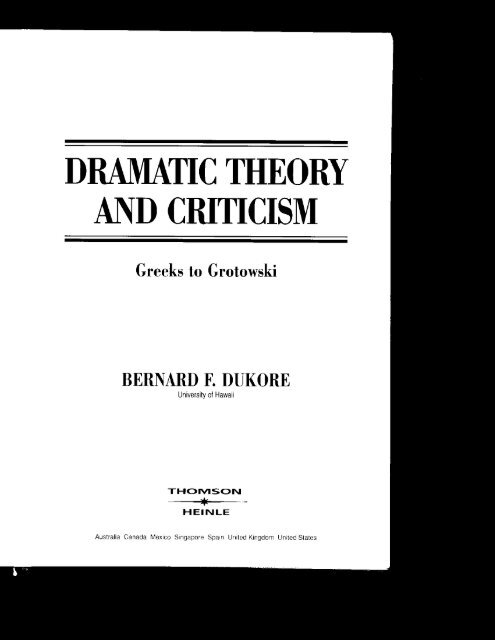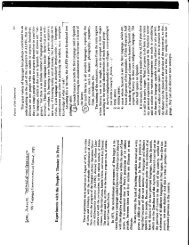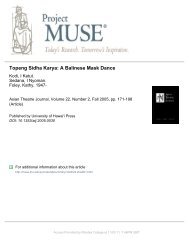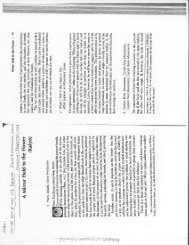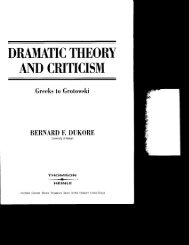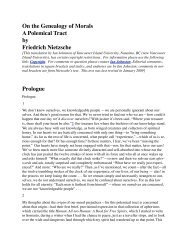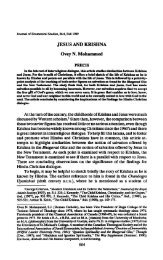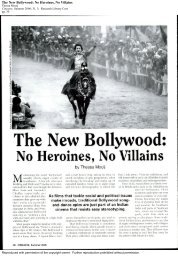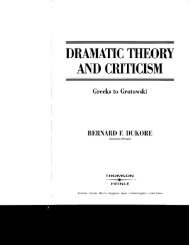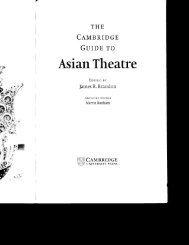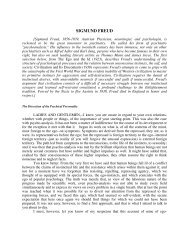Scaliger and Castelvetro - Yavanika
Scaliger and Castelvetro - Yavanika
Scaliger and Castelvetro - Yavanika
You also want an ePaper? Increase the reach of your titles
YUMPU automatically turns print PDFs into web optimized ePapers that Google loves.
DRA1VIATIC<br />
THEORY<br />
ND CRITICISM<br />
Greeks to Grotowski<br />
BERNARD F. DUKORE<br />
University of Hawaii<br />
-rHorvtsoN<br />
HEINLE<br />
Australia Canada l/ex co Sngapore Span United Kingdorn Unlled Stales
ll8 Renaissance Italy<br />
replied, contran to every expcctation of P<strong>and</strong>olfini: "l uill sai that next<br />
tirre v e ought to haug him. . . .8"<br />
A laugh is also evoked uith a shrcsd repll to somc proverb rvhich is<br />
uttcrcd, such as uas nadc bl Nlaestro Gerardo Boldcrio, a Vcronesc phl.sician,<br />
to tliat Signora of trlalaspini sho askccl hin for a rcnreclv for her<br />
onlv sorr. Thc phvsician tolcl hcr that thcrc nas nothing urorrg lith thc<br />
bor <strong>and</strong> that she should not givc hiur irrrr rucciicine. But thc rroman still<br />
insistcd that hc should preparc sorlrc rcmedr'. And aitclrpting to c\cr-rse<br />
herself for sLrch insisterce, she usccl l proverb, saving: "Oh sir, he riho hirs<br />
onlv onc cre often sipes it." And the phisician aclded: ",'\rrd hc lipcs<br />
it so nu.'<br />
cnd. llrc (r(l r5 llrc ---= :r\llr: ol lliilril! lrtrrr irr<br />
-><br />
r,,lra:'urtblq lorut- fot ooctn'<br />
l- ,----<br />
F \<br />
l.aclres, an(l rlocs nnt 'rrntli :rrirrr,t, .r. .r'rrrt'rr.ril tn thirrk. \\'lrct)cle-<br />
Vt. -<br />
Selections. From Selcct TrdtlsLttrrns fr(nn <strong>Scaliger</strong>'s Poetics. bv Irrederick Nlorqal Padcl<br />
ford. Yale Siudics in EDqLsh, No. 26. Ncl York: Hcnrr Holt <strong>and</strong> Co., 1905.<br />
1Drte of posthumous yrublicetior.<br />
languagc is used, thc purpose,r<br />
fact or rvith the thought of thi<br />
\\'as sung, its design seencd me<br />
that for the sakc of q'hich rnusi<br />
rucle ancl pristine invention was<br />
the rrccliun.r of its teaching. L,<br />
scribes urilitan, counsels, at ont<br />
lhc orp,'ris1,11,o of the Greeks-r<br />
of various artificcs, all is for o<br />
So in The Frogs of Aristophan<br />
in a poet can rrousc thc great<br />
good ansu,er u,hen he replied, "'<br />
the necd of being better nlen." . .<br />
\os is ttrere not onc end, a<br />
oraton', lncl in the drama? Ass<br />
the same encl-persuasion; for, Y<br />
cvcr language is usc-d-il-either ex<br />
'fhe<br />
cnd of learning is knowled<br />
in no narrol sense. An accura<br />
follovs: Belief based either upon<br />
'I'hus "l<br />
te sar', knoiv that D<br />
parted." Nou u,e do not know a<br />
as the truth. PersLrasior, again,<br />
the spcakcr. 'lhe soul of<br />
Jutc, or susccptibJc of<br />
cloing of sornething. l'ruth, in<br />
said about a thing <strong>and</strong> the thing<br />
. Corrcdv is a dramatic<br />
action, happv in its outcome,<br />
An inaccurate definition of<br />
fron the suggestion of<br />
privatc citizen." In the firsi<br />
stories, rvhich can be<br />
therc is aluavs the suggestion<br />
is invariablr tame. \\ftat else<br />
of imninent danger? F<br />
violencc at the h<strong>and</strong>s of<br />
in the Asinaria <strong>and</strong> The<br />
C)ncc morc, this definition<br />
the toga, for thev are not<br />
cmbrace me nes <strong>and</strong><br />
'l ragedv, likc comedy,<br />
: Iloth bv Plautus.
ldius Caesar <strong>Scaliger</strong> 119<br />
lauguage is used, the purpose, of course, is to acquaint the hcarer u'ith a<br />
fact or u'ith the thotght of the speaker, but because thc prinitivc poetry<br />
\vas sung, its design seemed nerelt' to please; ,vet underll"ing thc nusic rvas<br />
that for the sake of rvhich music u'as provided only as a sauce. In tirne this<br />
rude <strong>and</strong> pristinc invention u.as enriched bv philosophy, which rrade poetry<br />
thc mediun of its teaching. l,et it be fLrrthcr said that when poetrv de'<br />
scribcs nilitarv counscls, at one tirnc open <strong>and</strong> frank, at another craftvthe<br />
o,po,is11pn of the Greeks-u,hcn it tclls of tenpcsts, of wars, of routs,<br />
of various artificcs, all is for onc purpose: it iuritates that it mav teach.<br />
So in The Frogs of Aristophancs, to thc one uho asked hin, "\\ttat ncrit<br />
in a poet can arouse the grcatest aclniration for hin?" Euripidcs made a<br />
good ansg,er utcn hc rcpliccl, "'l'hc abilitl to irnprcss adroith,upon citlzens<br />
the need of being bctter rnen." . . .<br />
Non' is there not one cnd, <strong>and</strong> onc onlr', in philosophical exposition, in<br />
or:ttor\', ancl in the dranta? Assurcdh such is the casc. All have one <strong>and</strong><br />
thc same encl-persuasion; for, r'ou scc, just as we ucre saying abovc, uhenever<br />
language is uFdlT cither exprcsses a fact or the opinion of the speaker.<br />
The cnd of learning is knoulcclge, that is, knouledge, of course, interprcted<br />
in no narrorv scnsc. An accurate <strong>and</strong> sinplc de6nition of knorvlcclge is as<br />
follols: Belief based either upotr conclusive evidcnce, or upon a loose notion.<br />
'l}us "I<br />
u e sar. knol that Dido comnittcd suicide bccausc Aeneas departed."<br />
Nou u'e do not kuorv artt such thing, but this is popularly acccpted<br />
as the truth. Pcrsuasiou, again, neans that the hcarcr accepts thc Iords of<br />
the spcakcr. T'he soLrl of persuasion is truth, truth either fixed <strong>and</strong> absolute,<br />
or suscqrtible of qucstion. Its cnd is to corvince, or to securc the<br />
doing of something. Truth, in turn, is agreernent betrvccn that u'hich is<br />
sajcl about a thing <strong>and</strong> thc thinq itself. . . .<br />
. Comedl is a
.i''<br />
.-t'<br />
140 Rer,rissonce Ifah'<br />
corneclr, in thc rark of thc clt:rrirctcrs, itt thc n:rtttrc of tlrc actitil' altl in<br />
the ortcotnc. l'hese difTercrttcs dettinrrcl, itt tttnr, cliffcrelccs ir strlc. Comcdl<br />
enplovs charactcrs frortr rttstrc, or lotr'citl lifc. such as Cluetlcs' Davttr, ancl<br />
T'h;is.' ]'he bcgirrrring of r coucdr' Prcscnts a confnsecl statc of allairs' arrd<br />
this confusior is happih clcrretl ttp ai tlrc encl l'lic larrgulgc is that of<br />
evcrr,cl:rr lifc. fragcclr, ott the othcr hancl, crrlpJoi's kings irncl princcs' rrliose<br />
affnirs arc thosc of thc citr', thc fortress, arrcl tltc crttlp A tr.rgcdl oPcrls lrorc<br />
trancluillv than n cotucch, bltt thc otttconrc is borrifring.'l hc langu'rgt is<br />
gravi, polishetl, rcnloved fr(nn thc collocluial. AJI things rrear a trottl:rlcd<br />
look; tlrcrc is a pcrvacliuq sensc of cloottr. tlictc:rre cxiles ancl clerths 'lradition<br />
has it tlrlt thc Nlacctlotriltt litrg. -,\rclrelirtts, tiie illinrrate friencl ancl<br />
patror of liuripides, irskcd ihc poct to rnrkc hirtr tht hcro of I tr:rgcch,<br />
bLrt thet Euripiclcs rcpliccl: 'Inclcccl I calrrr{)t (lo it; r'our life Prescrlts no<br />
adequatc nrisfortunc."<br />
-lirc<br />
,r,r,rc traqcclv is clctirecl frottr 'p,i7ns. tire hegoat' for thc simple<br />
rcason that treqech uas lctcd rn thc lrtinor of that dir iritl to nlrtttn thc<br />
-l<br />
goat $,as \\'ont to bc sitcrihcccl. llcn. in turn. lhe goat \us giverl as a pttze'<br />
ihat tlrc rictor nright srcrificc it to tlrc god. It i'i rccordecl ls art lssrtrccl fl(t<br />
that tragcclics ucrc 6rst actccl irr thc \iintilge sca\orr' lncl tlris garc thc<br />
gtanrmarians an opportLrnitt to clerirc the ttanc frottl 'p,1714", the lintlgc'<br />
just as if it $cre rr,,7?31,r, a uord llrich \ou actuall\ hnd irt tlie Acl:rartitns<br />
ofAristophaues....<br />
Tlrc clefinition of tr.rqcdr givcrr bl r\ristoilc is as follots: lrlgedr is an<br />
jnritrttion of rn itttiott thnt is illuilrious, corlPlctc, rtrcl of a ccrtrtin rrra4rti<br />
tuclc, in crnbcllisltccl llngulgc. the cliflcrerrt kirrcls of crrbcllisltttrcnts lleiug<br />
lariouslt curltlolccl in thc cliller-cnt prtr-ts antl rtot in tllc fortl of ll'tit'tfi.'tl,<br />
but tLrouglr pitv arrcl fclr cllcctrnq thc pttrgatiott of such likc pitssiors<br />
"<br />
I clo not sislr to atteck this clehritiorr otlrcr tlrln br addilrg utr otrl: '\<br />
triiqctlv is thc irrritltiorr of thc aclr ersitt of .r distinguishccl rn:rtt: it ettiplors<br />
thci fonn of lctiotr. Prcscrtts :1 clisrrstllrtts clittoticrnctlt' ltlcl is crplcssetl tn<br />
inrprcssive mttticlL llrugulgc. 'llrrtttgh -\ristotlc aclcl-s harrlllrtlr lltlci stltlg'<br />
ther arc not,:rs thc phrlosophcts :lr. of thc csscttcc of traqc
lulius Caesat <strong>Scaliger</strong> l4l<br />
Altirough tragedy rcscrrblcs this cpic poctn, it difien in rarelv intro'<br />
ducing persons of the lorver classcs, such as lresscngen, ncrchants, s.llors,<br />
<strong>and</strong> the like. Conredies, on thc othcr h<strong>and</strong>, noer admit kings, save irt such<br />
rarc instanccs as t\e AnQhitriort of Plautus. I u'ould lirrit this gcneralization<br />
of course to tLose plavs which cmplov Greek characters <strong>and</strong> the Grcck<br />
dress, for the Ronans have admitted at \\'ill tire dignificcl toga atd tabea.<br />
-fhe<br />
u'irnton charactcrs of thc satvric plals are drinking, joking, 1olly,<br />
sarcastic fcllo\\'s. 'l hc rnimc emplovs cioth-fnliers, shoemakcrs, butchers,<br />
poulterers, fish dealers, <strong>and</strong> uarkct-garclcners. Such charactcrs, indecd, rvcre<br />
adnittccl in thc C)ld Conrcclv, as s,cll, for thc subject-matter of thc Old<br />
Couredl uas not verv clifferent fron tbat of thc urimcs, <strong>and</strong> the difierence<br />
bctueen the two forns rr,as largch in thc division into acts, ancl thc introduction<br />
of the chorus. 'fngcdv irnd conecll arc alikc in mode of reprcsentation,<br />
l>ut cli{Icr in subjcct rnattcr <strong>and</strong> heatnrcrlt (ordo). 'Ihe matters<br />
of tragcdv arc grcat ancl tcrribic, as couulrlds of kirrgs, slaughtcrs, dcspair,<br />
snici
142 Ilenaissance Italt<br />
., The opening part is gratifying to the guard, <strong>and</strong> disturbing to Clvtenlnestra<br />
,.$,2 becausc of the arrival of her lnsb<strong>and</strong>; thcn comes the murdgr, ufiiql rnq]
LodoyicoCastelyetro 141<br />
tine for stage-representation is o$jfx or q.tglt--]lggs, it is not true to<br />
r )\ "'r'1<br />
,.<br />
'<br />
lifc to have a storm arisc, irnd the ship founder, in a part of the sca from<br />
-rL'<br />
rvhich no l<strong>and</strong> is visible. Let thc first act bc a passionate lancntation, the<br />
chorus to follorr rvith execrations of sea life; thc second act, a priest u-ith<br />
votive offerings conversing $ith Alcvone <strong>and</strong> her nurse, altars, firc, pious<br />
sentinents, the chorus folloling u,ith approbation of the vorvs; the third<br />
act, a r)r€sserger announcing thc rising of a stonr, together $ith rumors<br />
as to the ship, the chorus to follorv uith mention of shipurecks, <strong>and</strong> much<br />
apostrophizing of Ncptulc; thc forrrth act tuurultuous, thc report found<br />
true, ships,recks dcscribed bv sailors <strong>and</strong> mcrchants, thc chorus benailing<br />
thc cvcnt as thorlgh all u,cre lost; tirc fifth act, Aloone peering anxiouslv<br />
over the se:r <strong>and</strong> sighting far off a corpsc, follolcd bv the resolution, when<br />
slrc uas al>out to takc hcr oun lifc.'lhis sanrple outliue can bc cxp<strong>and</strong>ed<br />
br, thc introduction of othcr charactcrs.<br />
I-odorico fastelrelro j:: ,:-;<br />
0n Aristotle's Poetics tsTo<br />
r z:"<br />
\3i,<br />
Poctrt, is irnitation <strong>and</strong> its general rnodc is inritation. . . .r<br />
--i:;---r--.,<br />
.- - - --=i-- , .<br />
llre qrrrlificd poil \ dul\ i, t.r irritlt( tlrrouqlr .t,tr ulalien llre 7 r )r", rts.<br />
realit-r, of pcople caught in thc acciderts oi furtri*l.-l ffi- 1""u"<br />
the discovery of thc rcalitl hidden in the accidents of nature to the philosopher<br />
<strong>and</strong> thc scicntist.<br />
Nou', sincc drama rvas invented, as I sa\', to delight <strong>and</strong> provide recreation<br />
for thc colrrnon pcoplc, it rrust havc subject mattcr rvhich the comnon<br />
people can underst<strong>and</strong> <strong>and</strong> rihich lvhen thev undcrstaud it uray make them<br />
happv. This subject mattcr should ircludc srrch things as everyday occur'<br />
tl3<br />
16r., i"r 1<br />
Selections. l ranslatcd by Charlcs Cattnig fro r thc 1576 revised <strong>and</strong> amended edition.<br />
Copvright 1974 by Charles Cattnig. Printed with permjssior) of the translator.<br />
1\\'hcrcAs carlicr Itrlian critics translated lristotle's tcttlt pipn6Lt as inritd?ione<br />
(e.e., Cinthio <strong>and</strong> Trissino; cvcn Do atus rses the Latin inlitatiolrcm), C.stclrctro uses<br />
the rvorcl rassomiglian:d exchrsively. I trarslatc the latter as "representation"<br />
ftranslatois<br />
notei.
144 Renaissance Italy<br />
rences <strong>and</strong> such things rvhich pcoplc discuss, e.g., rvorld nervs <strong>and</strong> history.<br />
And for this reason we asscrt that the subject rnatter of Poetrv is historical<br />
sinilitude or imitation. Because it is an initation, poctrv not onlv rolarcls<br />
its inventor uith glory-<strong>and</strong> nakcs <strong>and</strong> coustitutes him a poct-but it<br />
delights us muclr more thar the history of actual past c'"ents. Ihcrc'<br />
forc, bccause the data of the scienccs <strong>and</strong> arts are not conprchensible to<br />
thc peoplc, not onlv nrust thev be avoicled ancl cliscarded as the gencral<br />
subjccts of poetn, but carc must also bc taker that no spccific refcrertce<br />
to thc matters of arts <strong>and</strong> sciences is nr:rde in anv part of the Poem. . . .<br />
T'ragedv puts coutpassiort ancl fright in thc sortls of thc sPcctators or<br />
the audicncc. . . . Fright <strong>and</strong> conp:rssion arc thc tso obiectivcs of tragedl. . . .<br />
Nlurders, <strong>and</strong> othcr such difficrrlt things, arc not sho\\'n onstagc bccause<br />
thev are difficult to perforDr uith dignih <strong>and</strong> ." crisimilitudq. It_is better_to<br />
h4r'e thg14 occur ofistage ancl then le;gqalt1tcdjla l1,e!!!!gqr- ll)rlnatic<br />
<strong>and</strong> narrativc poctrvl are also differcnt bccausc tlte narriltivc can interPrct<br />
in a feu hours nranv thiugs u.hich happcncd in mant' hottrs <strong>and</strong> in nan.v<br />
hours a fov things lhich ltappened in a for' hours. But drarna, uhich<br />
rcprescnts the cvents as taking placc, is incapablc of crcating this effcct<br />
bccause the jr.t-llcrfclnnralgg<br />
-tinrc-spgtl ,i5Jlr,-c-,s4.!r,r-q
\\'ere aware of that iirrritation, how could thet excuse thcir crror? For in<br />
sorne of their comcclies thev h:rre Leprocrtucl rrtrorrs sltich arc Jongcr than<br />
oneda,v....<br />
'l<br />
he end of tragcdr, is action aDd not thc ethical prcdilcctions of charactcrs,<br />
for if<br />
rvhich dctcrmines<br />
llrr r, lror'.. llrerefore. acfion. .rrc tlrc cn
146 Renaissance Italy<br />
pcrmit the presentation of thc rvhole of a singlc complete action, if the<br />
action is quite long. And this is thc principal <strong>and</strong> essential reason rvhY thc<br />
plot of trigedy <strong>and</strong> comedv urust be single, i.e., it nttst contain onlv one<br />
action concerning one Pcnon, or ts'o regarded as one because of their<br />
intcrdepcndcncr . . . .<br />
Thc plot of ftragedv <strong>and</strong> the cpic] nust contain action \\'hich is not<br />
onl,v hunar but also magnificent <strong>and</strong> ro1al. And if it is to contain action<br />
bv a mcmber of the rovaltr', it fol'lorvs that the plot nust contain action<br />
wfiich definitclr, occurcd lrrld utich involves a king who has lived <strong>and</strong><br />
uho is knorr,n to have lived. . . .'lherefore, ihe plots of all tragedics <strong>and</strong> all<br />
cpics are <strong>and</strong> nust bc madc up of mishaps rvhich can be callcd historical'<br />
aithough for so c reason Aristotle had a cliffercnt opinion . .i But these<br />
happenings Drust not bc revealed bv means of histon or reDown, cxcePt<br />
bricflv <strong>and</strong> gencrallr, so that the Poct can exercise his function <strong>and</strong> shorv<br />
his talent in finding thc tavs <strong>and</strong> particular nethods of dranatizing the<br />
abor,c-mcntioncd situations.. ..<br />
\\/e arc rvilling to adnit thc possibilit-v that it is casier to make thc<br />
,9plot of a tragedr ancl arr cpic than of a courcdt, bccause !l the plots o-f<br />
t7'J , the first<br />
as hc does c<br />
l ,rt<br />
poets spccia) trlcut to struciurC of conr.ch lrt in r trting<br />
thhg, <strong>and</strong> becatrse actual events or historv have no Part in it, thc Poet<br />
can even assign \\llatcver Dalres he u'ishes to his cb'lrar:tcrs He can do<br />
this u'ithout oficnse, atrcl uithin rcason he mltst do it. IIe can design a<br />
happening cntirelv invcntecl br hirnself fhereforc, it must be a situatioir-<br />
dealilrg lith privirtc pcrsons of ltich no one rencrnbcrs either the<br />
incidcnt or the pcoplc involr'cd, sincc ther have trot bccn preservccl for<br />
posteritv as histor! or rcllowll. .<br />
In orcler that thc plot rrav be beautiful, the sixth csscntial rcquire<br />
nent is that it be astonishing Earlier tlc explaincd uhile defining tragcdv<br />
that it is not onlv a rePrcscntatiolr of an action that is magnificent, completc,<br />
ctc., but also a rcPrcserltation of terror-causing <strong>and</strong> contpassion-nraking<br />
ihings. Ancl since these terror'causing <strong>and</strong> cotnpassion-nlaking things are<br />
fundan.rentalh terror causing <strong>and</strong> cornpassion making through the emplovnrcnt<br />
of the astonishing, one should not otlit saling that the astonishing<br />
gcneratcs :rnd increascs tcrror lncl cornPassiolr. lhis rvill not givc us a<br />
cornplctc unclerst<strong>and</strong>ing of $hat scares us ancl $hat fills us $ith cornPassion'<br />
Thc esscntial clerDents of thc action or of the plot of tragedv are terror<br />
. lld c0nDassiolr.<br />
, . .$ ,- It is the Poet's<br />
The objectiue. ol-tragedg-q- of the plot of trag{ll '- is h:rppines- or<br />
1'::<br />
t3$::.. brrt nur (\elt kind .,f lr'rppirrcs' or \adrr(\' \\ tr-rrruil lot ton<br />
sPccial talcnt to structure thc Plot ot conle(\' D! rnvcDrrng<br />
the gencral <strong>and</strong> particular aspccts of a situatioll llecause he invcnts evcn'<br />
:rScc Poelics, chap. 9 [trer]sl:rtor's notc].<br />
r<br />
fuse the happy or sad conc<br />
are the objectives of com{<br />
happy conclusion of hage<br />
cr49l_rf_$ll-ol-!fuloi<br />
or frour the loss of kinship<br />
sists in <strong>and</strong> restricts itself<br />
death or of a sorrowful<br />
arc its propcr goals. . . .<br />
The purpose of<br />
but neithcr that same<br />
suitablc for tragedy. For<br />
corcealment of some<br />
the<br />
consists in <strong>and</strong> restricts<br />
of sornc disgrace or<br />
unrecluited love, etc. And<br />
. . . The characters of<br />
of tragedv are roval <strong>and</strong><br />
what thev u'ant. If<br />
do not appeal to the<br />
Nor do thcy endure<br />
own h<strong>and</strong>s, following<br />
<strong>and</strong> relatives; in<br />
but somctimes even<br />
considercd to be the<br />
ful cnough to revenge<br />
upon others is never<br />
to their property.<br />
marriage or through<br />
perpetual marriage <strong>and</strong><br />
that if they are to<br />
happiness, or at least<br />
happiness by escaping<br />
into misery or disgnce<br />
But the characten<br />
the courts. They live<br />
appeal to officials to<br />
their self-respect or<br />
into their own h<strong>and</strong>s<br />
selves or othen for<br />
their condition is
Lodoyico Castelyetr
1-18 Renaissance ltaly<br />
'Ihcir<br />
happiness in orclcr for them to apprcciate checrfultress. happiness<br />
can gro\\, bv manv clcgrecs ancl ll a little bit of luck, such as A dcsircd<br />
wcdcling or sorrcthing sirrilar. And conversel\', iniurv or medium disgracc<br />
can rn:rle therr unhappr'. Ancl thcsc :rre thc rcasons uhv thc happl<br />
rncl sacl cndinqs of tragedl arc different fron thc happl ancl sld endings<br />
ofcorncdt,....<br />
'l<br />
irereforc, tragcdl has cithcr e hlppr ,,r I slcl crrditrg .\rrd even u'hcn<br />
it has a happl cncling, it gencrirtcs tcrror ltcl cotnpassiotr to a lesscr c\tent<br />
bccrarrsc the roral cirar:rctcr falls into grcat danger.r Becanse the dangcr<br />
is urixed. thc jol is not Iitltout s:ldl)css, as trc sill explain liricr. IIouoer,<br />
tragcah gercratcs sitnilar ctlotiorrs to a grcltcr ertellt whcrr it has a sacl<br />
cncliDg. Thus, thc purposc of tlle Plot of tragcdv is thc jo! an
Lodovico <strong>Castelvetro</strong> 149<br />
clear horv they can correctlr be callcd 'iso;j, i.e., pleasure or delight. And<br />
it must imnediatelr be dcscribcd as a utilitarian function, since thc soul<br />
is made lrcalthv b\, ru."tn of vcn bitter medicinc. 'fhat pleasurc arising<br />
frorn compassion <strong>and</strong> terror, rvhich is reallv pleasure, is that rvhich rvc<br />
have earlier rcfcrred to as "ol)lique pleasure." At tirc time, ll'lrcn rve experience<br />
displeasure bccluse others unjustlv sufier misery, wc acknoq'lcdge<br />
that ne are good, bccarrse iljustice bothers us. Thc natural lovc that u'e<br />
bring to ourselves is a ven great pleasurc for ulrich r,e are gratefnl. To this<br />
pleasure is aclded still another that is rot at all small. Whcn we see othe$<br />
being unjust'l\' opprcsserl <strong>and</strong> rcalizc that the sarnc could happen to Lts or<br />
to peoplc likc us, rlc lcrrn gprc!,I1, <strong>and</strong> unconsciouslv that le are subject<br />
to nany nisfortnncs, <strong>and</strong> that it is not lise to place trLrst in the tranquil<br />
course of events. \\ic arc mnch more (e\hlgf !ylhjl!.It"!g1f!_]:ry1<br />
than if enothcr, c.g., ir tcr(lrrr, *ere opcnh to lecture us on this same subject,-for<br />
experienc_c of things thqt hg_r'c lalptncd-6rrrlr inrpresses undcr'<br />
st<strong>and</strong>ing in our souls nrorc effectlgl) dr;rrr--ol bc aeeqry-TiiLad-!1 l!9<br />
nere yoicc oi a leiincd authoritr'. And uc reioice more in thc littlc wc<br />
learn for ourselics tlan in thc much \\'e lcarr from othcrs. for r\ie arc not<br />
able to learn from othcrs unlcss lc adnit ignorance of that ulrich ue lelrn<br />
ancl an oblisatiol to our teachers for uhat le learn fron tltem.<br />
'fhosc<br />
l'ho rnaintain that poetrl' \\as invcntecl essentiallt' for utilitarian<br />
purposes, or for usefulness <strong>and</strong> dclight togcther, should bervare of setting<br />
thcnrselvcs against .\ristotlc's ruthoritr. In this part of the Poetics <strong>and</strong><br />
elserhere, it docs not secm tlr:rt hc allorrs anv end othcr than delight.s<br />
And if he incleecl grrnts somc utilitarian function, lrc conccdes it as ircidcntal,<br />
as is thc pruification of tcrror <strong>and</strong> cornpassion bv means of traged). . . .<br />
In traged-r', thc placc of thc action is restrictcd Dot onlr to one cit)<br />
or house or coLrntrvsiclc, or siuril:rr site, but to that scenc rhich alone can<br />
bc absorbcd bv the vision of onc rcrson.<br />
'<br />
Sre Pu, ,,ci. . h tp 2? 'r|l.l..l r'' nole


